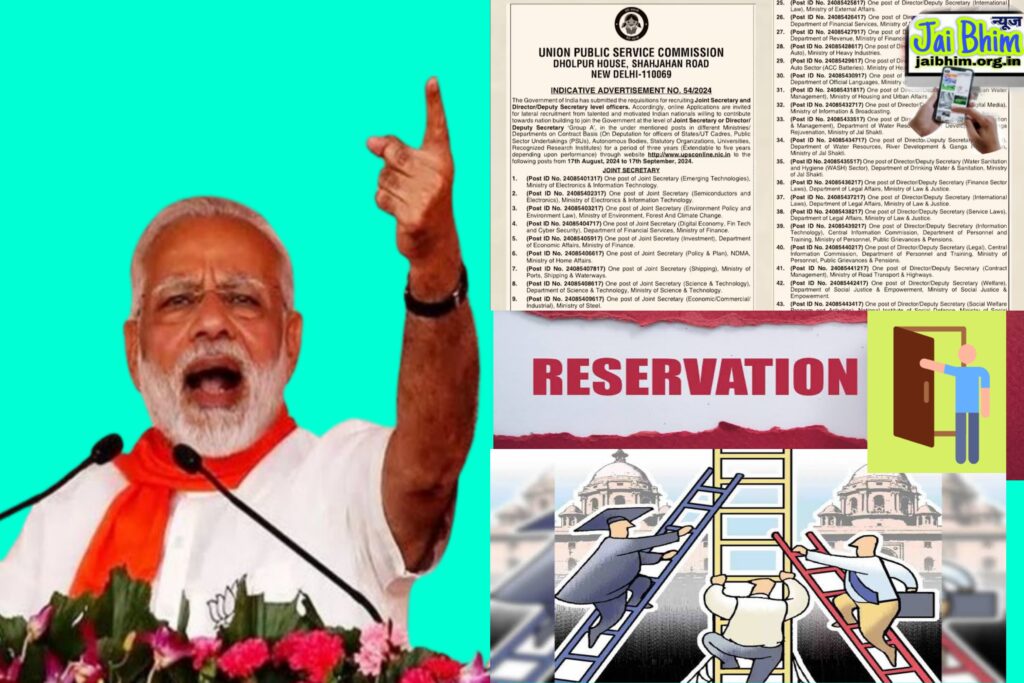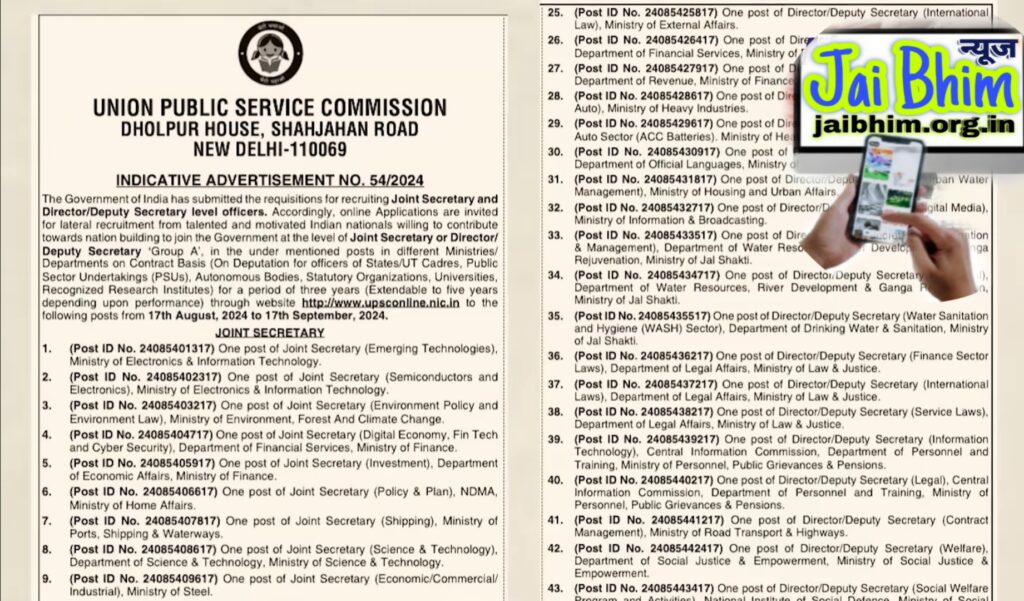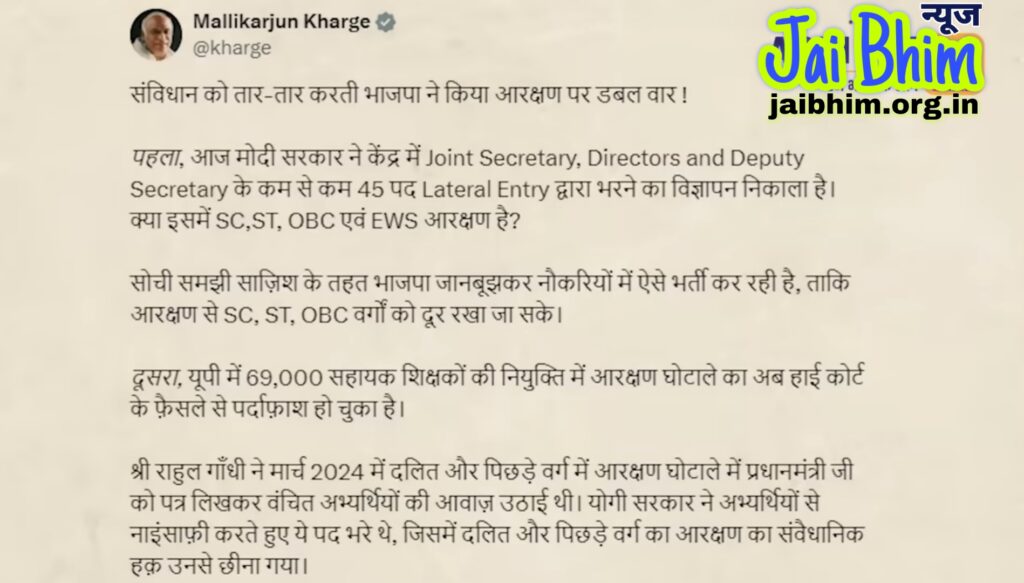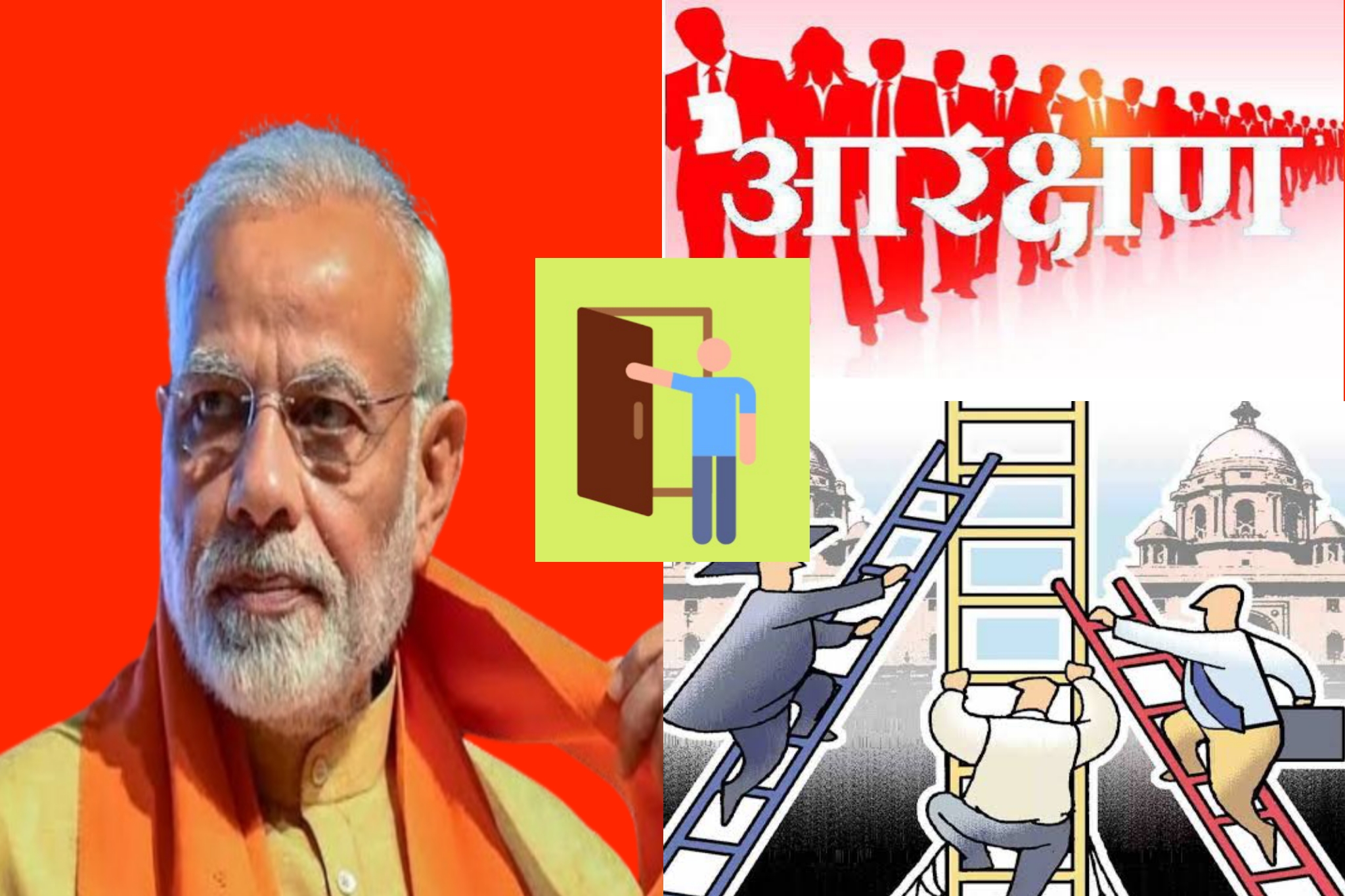
A Double Attack on Reservation: Mallikarjun Kharge
The Indian Constitution is a living document that embodies the aspirations of its people, particularly those who have historically faced systemic discrimination and oppression. Among its most crucial provisions is the system of reservations, which seeks to ensure representation and opportunities for the Scheduled Castes (SC), Scheduled Tribes (ST), Other Backward Classes (OBC), and Economically Weaker Sections (EWS). This system is not just a policy but a constitutional right, designed to correct centuries of social injustice and provide a level playing field for those who have been historically marginalized.
However, recent actions by the ruling Bharatiya Janata Party (BJP) under Prime Minister Narendra Modi’s leadership suggest a deliberate and systematic effort to undermine this constitutional guarantee.
The Lateral Entry Conundrum: Bypassing the Reservation System

In a move that has raised alarm bells among social justice advocates, the Modi government recently issued an advertisement to fill at least 45 positions of Joint Secretary, Director, and Deputy Secretary at the Centre through lateral entry. On the surface, this initiative aims to bring in fresh talent and expertise from outside the traditional Indian Administrative Service (IAS) and other civil services. However, the glaring omission of any mention of reservations for SC, ST, OBC, and EWS candidates reveals a deeper, more troubling agenda.
What is Lateral Entry?
Lateral entry refers to the process of recruiting professionals and experts from the private sector or academia directly into senior posts in the bureaucracy. It bypasses the traditional route of civil service examinations, which are based on the merit of people with impartial ideology and have a well-defined reservation system to ensure diversity and representation from all sections of society.
Why is this problematic?

The introduction of lateral entry without a corresponding reservation policy is problematic for several reasons:
- Erosion of Representation:— The traditional civil service examination, conducted by the Union Public Service Commission (UPSC), is designed to ensure that candidates from all backgrounds, including those from marginalized communities, have an equal opportunity to serve in senior government positions. By introducing lateral entry without reservation, the government effectively sidelines candidates from SC, ST, OBC, and EWS backgrounds, thereby eroding their representation in the higher echelons of the bureaucracy.
- Circumventing Constitutional Mandates:— The Constitution mandates reservations in public employment as a means of ensuring social justice. The lateral entry scheme, as currently implemented, bypasses these constitutional mandates, raising serious questions about the government’s commitment to upholding the principles enshrined in the Constitution.
- Widening Inequality:— The lack of reservations in lateral entry positions is likely to exacerbate existing inequalities within the bureaucracy. Those who already have the privilege of better education, access to networks, and resources are more likely to benefit from lateral entry, further entrenching the dominance of certain groups over others.
The Broader Implications
This move is not an isolated incident but rather part of a broader pattern that suggests a deliberate attempt by the BJP to undermine the reservation system. By creating avenues like lateral entry that do not require adherence to reservation norms, the government is effectively diluting the impact of affirmative action policies that have been painstakingly built over decades.
The absence of reservations in lateral entry positions is a stark reminder of the BJP’s ongoing efforts to reshape the Indian bureaucracy in a manner that sidelines marginalized communities. This move is not just an administrative decision but a political one, with far-reaching consequences for the future of social justice in India.
The 69,000 Teacher Recruitment Scam
The second, equally troubling, attack on reservation comes from the state of Uttar Pradesh, where the appointment of 69,000 assistant teachers has been marred by allegations of a reservation scam. The Yogi Adityanath-led BJP government has come under severe criticism for its handling of these appointments, which many argue have systematically denied Dalits and OBCs their rightful share of jobs.
In January 2019, the Uttar Pradesh government conducted an examination to fill 69,000 assistant teacher posts in government-run primary schools. The recruitment process, however, soon became controversial, with allegations that the reservation norms for SC, ST, and OBC candidates were not properly implemented.
The High Court Verdict
The Allahabad High Court recently delivered a verdict exposing the discrepancies in the recruitment process. The court found that the Yogi Adityanath government had indeed violated reservation norms, thereby depriving thousands of eligible candidates from marginalized communities of their rightful jobs. The court’s ruling vindicates the claims made by these candidates and lays bare the systemic manipulation of the reservation system.
The Broader Implications
The 69,000 teacher recruitment scam is not just a case of administrative oversight; it is a deliberate and calculated move to undermine the reservation system in Uttar Pradesh. The BJP’s actions in this case reveal a clear disregard for the constitutional rights of marginalized communities and an intention to deny them their rightful share in government jobs.
A Well-Planned Conspiracy?
When viewed together, the introduction of lateral entry without reservations and the 69,000 teacher recruitment scam point to a broader, more insidious agenda. These actions are not isolated incidents but appear to be part of a well-planned conspiracy by the BJP to systematically dismantle the reservation system.
Why Target Reservations?
The BJP’s antipathy towards reservations is rooted in its ideological orientation. The party’s historical association with upper-caste interests and its emphasis on a ‘merit-based’ system often comes at the expense of social justice policies like reservations. By undermining reservations, the BJP seeks to consolidate its support base among upper-caste voters while marginalizing those who rely on affirmative action to access opportunities.
The Impact on Marginalized Communities
The impact of these policies on marginalized communities cannot be overstated. For millions of SC, ST, OBC, and EWS individuals, reservations are not just a policy but a lifeline—a means to escape generations of poverty, discrimination, and social exclusion. By systematically eroding this lifeline, the BJP is pushing these communities further into the margins of society.
The Need for Vigilance and Resistance
In light of these developments, it is imperative for all those committed to social justice and equality to remain vigilant and resist the BJP’s attempts to dismantle the reservation system. This resistance must come from multiple fronts:
- Legal Challenges:— The judiciary has a crucial role to play in upholding the Constitution and ensuring that reservation policies are implemented faithfully. Legal challenges, like the one that led to the High Court’s ruling in the UP teacher recruitment scam, are essential in holding the government accountable.
- Political Mobilization:— Marginalized communities and their allies must mobilize politically to defend their rights. This includes voting for parties that are committed to upholding the reservation system and advocating for policies that promote social justice.
- Public Awareness:— Educating the public about the importance of reservations and the BJP’s attempts to undermine them is crucial. Media, civil society organizations, and activists must work together to raise awareness and build public support for the reservation system.
- Strengthening Institutions:— There is an urgent need to strengthen institutions like the National Commission for Scheduled Castes (NCSC), the National Commission for Scheduled Tribes (NCST), and the National Commission for Backward Classes (NCBC) to ensure that they can effectively monitor and enforce reservation policies.
A Call to Action
The BJP’s recent actions—whether through the introduction of lateral entry without reservations or the reservation scam in Uttar Pradesh—represent a direct attack on the constitutional rights of India’s marginalized communities. These moves are part of a broader agenda to erode the gains made by affirmative action and to perpetuate the dominance of upper-caste interests in Indian society.
Also Read: Lateral entry is a big conspiracy against the country, said Akhilesh Yadav.
As citizens of a democratic nation, it is our collective responsibility to defend the Constitution and the principles of social justice that it enshrines. The reservation system is not just a policy but a moral and constitutional imperative, essential for the creation of an equitable and just society.
The battle to preserve and strengthen this system is far from over. It requires constant vigilance, political mobilization, and a commitment to the values of equality and justice. The time to act is now, before these attacks on reservation become irreversible, and the dream of a truly inclusive India is lost.

